I grew up in a weird food time. My childhood was filled with the convenience of prepared foods - boxes of Hamburger Helper, easy to grab bars, colorful ketchups and inventive chip shapes (3D Doritos anyone?). I was pretty distant from vegetables that were fresh from the garden, and was instead familiar with bags of watery baby carrots, iceberg lettuce heads wrapped in plastic, and frozen and canned vegetables, some of which I still love. My family was very busy, and the convenience of food “technology” was of the utmost importance.
I have heard from more than a few Silent Generation grandparents and Baby Boomers talk about growing up with a garden with a wistfulness, longing for that time but regretting not ever having a garden themselves. I wonder why many of our parents didn’t recreate that joyful experience of a garden for us when they all bought a house easily in the late 1900s (LOL). Worse than not having a garden, I have heard people of all ages insist that vegetables don’t have a flavor. WHAT?! But then I think that many of us have just forgotten that vegetables are not inherently bland like much of the grocery store produce is thanks to industrial agriculture.
Enter CSAs (Community Supported Agriculture). A CSA is where you pay a local, small scale (i.e. not industrial) farm to get a box of produce for a set amount of time, usually the main growing season. Here in the Deep North that is usually from June to late September. Vegetable CSAs are most common but there are lots of other kinds - meat, dairy, herbs. Many farms offer boxes based on season too. We get the spring, summer, fall, and winter box from our CSA, and our farmer also offers add-on shares like a kimchi share, pesto share, salsa share, and tomato share if you want to preserve these foods for the year. Since doing the winter share for the first time this last winter, we have only had to buy all our vegetables for the week from the grocery store for a couple of months. I felt like it was too good to be true but it’s not! You too can enjoy seasonal produce, even in the upper midwest’s zone 4b region.
So here is why you should get a CSA:
Seasonal produce: Getting vegetables at certain times of year makes them precious. The idea that we have access to almost any kind of produce at any time of year is a result of industrial agriculture, and it has made them less special. I love that I get to make the most of asparagus in the spring, butternut squash in the fall and winter, and strawberries for a fleeting couple of weeks in early summer. Do I buy strawberries out of season sometimes? Sure. But getting them in the share feels so miraculous. This frame of mind will make you treasure the food for the moments you have it.
Wide variety of vegetables: If I’m going to the grocery store to buy my produce, I want to be as efficient as possible, and I will work that bell pepper trio pack into as many meals as possible. With the CSA, even with the spring box, we get more than 10 different types of produce and herbs, which means a wider variety of nutrients and foods.
Better taste: For those that claim that X vegetable “has no taste” or “doesn’t taste like anything,” I beg to DIFFER. People who say that are just revealing that they haven’t had the joy of munching on an intensely sweet crunchy carrot with the herbaceous greens still on the top, or the burst of juicy fragrant flavor of a strawberry no bigger than the size of a thumbnail. You deserve to eat flavorful, delicious vegetables.
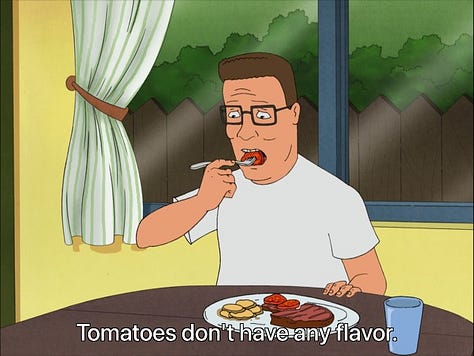
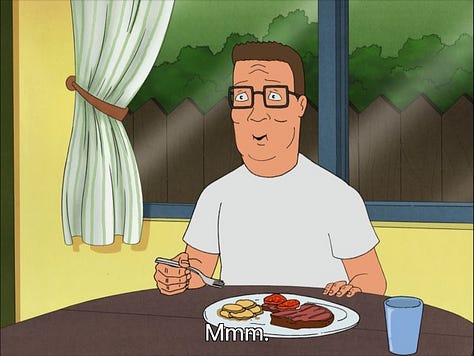
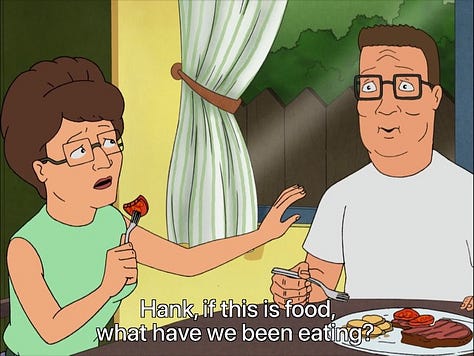
Hank & Peggy realize that food has flavor Last longer: Because CSA vegetables are often picked/harvested the day you get the box, they are fresher (have better flavor) and last longer. As long as you store it correctly, your produce will last a long time since it’s not spending a lot of time being shipped or sitting on a store shelf. I’m not exaggerating when I say that we have stored beets in our produce drawer in the fridge for MONTHS and they have been just as delicious as the day we got them.
More environmental: Getting your veg straight from the farmer means less plastic and shorter truck distance which means less CO2 emissions from transport and refrigeration over long distances. Paying for a CSA is better for your local economy since your dollars are going right to a farmer rather than to a corporate grocery store and the Big Ag industry. As capitalism continues to crumble, the CSA model will be more resilient. Small farmers know what to do to control pests without spraying them with pesticides which could in turn impact another crop, or contribute to health issues. You might see shortages at big chain grocery stores, but that is less likely to happen with small farms since they are building resilience into their models by using smaller scale farming practices.
Culinary challenge: This one is for the home cooks among us, which if you’re reading this newsletter, probably includes you. I LOVE a challenge in the kitchen, and finding the best way to cook and preserve vegetables that fits the tastes of the people in my house. We are obsessed with thinly slicing kohlrabi, green apples, and onions for a sliceable salad (similar to this recipe), charring asparagus on the grill, and pickling green beans. I would have never tried these recipes if not for the CSA. I would have probably never even bought kohlrabi in the first place but now I can’t wait until we get it in our box.
Preserve it: This is one of the most rewarding parts of having a CSA membership. Throwing kale that’s been stored in a gallon freezer bag from the summer into a thick winter soup is its own special flex, plus the flavor is unmatched. Never having to buy green beans because you have a stock of pickled ones for bloody marys and blanched ones in the freezer for tater tot hotdish for the entire year is convenient and rewarding. As a bonus, you will build an understanding of the value of food production, the food itself, and the knowledge of food in a deeper way. If you have little ones in your life, this is something that you can pass on to them that will be essential for our/their future.
Lower cost: Getting vegetables from the CSA is a lower cost when you calculate it out week to week. I’m amazed at the bounty we get every week, and thinking about those boxes in mid to late summer costing an average of $20 is a steal. You do have to have a chunk of money (hundreds of dollars) upfront to pay for it ahead of the season, which is definitely a barrier. BUT our farmer offers payment plans for those that can’t swing that large amount at one time, and they have an option to purchase a half share or full share as a donation if you DO have the funds to distribute your wealth.
Moral superiority: Rest in the fact that you are better than everyone else for getting a CSA. This goes a longer way than you’d expect when you’re elbows deep in dealing with the abundance and labor of a mid-August box!
A few CSA challenges:
Being out of town in the summer: You gotta get someone to pick it up, process, and store it and/or use it. This can be annoying but is a great way to have others in your life test out what it’s like to get a share.
Time spent preserving and processing food: I’m not going to lie that this is a factor. To get it right, it can be a lot of work so food doesn’t go to waste.
Learning curve re: how to store every kind of veg: You’re going to have some misses and that’s okay! You’ll get a moldy tomato or nasty herbs or wilted greens every now and then in the beginning. Just remember that this is part of learning and you’ll do something different next time!
What does this look like in practice?
Here’s what we got on Thursday in our third spring CSA: asparagus, cilantro, chives, lettuce head, greens mix, mustard greens, onions (storage), oregano, potatoes (storage), radishes, rhubarb, turnips. You can watch me process the veggies here. Processing is one of the most time intensive parts of a CSA but it has a huge payoff. Getting the vegetables stored correctly extends their shelf/fridge life, and will ensure that you won’t waste it. I’ll be writing more about this throughout the summer if you’d like. Let me know ⬇️ !
We get our next (and last) spring box in two weeks before our weekly summer share starts so here is how I’ll use the veg from our box this week over the next two weeks in our meals! There is a mix of using them right away and preserving for the future. Note: our CSA sends a newsletter the day before we get the vegetables and I wait to meal plan until I get this so that I am intentional about using all the veggies.
Asparagus: on the grill last night with BBQ chicken thighs
Cilantro: gave ⅔ of it away to friends, garnish for crispy black bean tacos, chimichurri which will be frozen in little tablespoon pieces to use for the next year
Chives: salads, garnish, and in the chimichurri
Lettuce heads: salads
Greens mix: salads, falafel gyros and Mediterraneanish charcuterie dinner
Mustard greens: salads
Onions (storage, from fall): falafel gyros, crispy black bean tacos, and quick pickled for Mediterraneanish charcuterie dinner
Oregano: salads, add to black beans for crispy black bean tacos, dry the rest
Potatoes (storage, from fall): on the grill last night with BBQ chicken thighs
Radishes: snacking, salads, crispy black bean tacos, falafel gyros and Mediterraneanish charcuterie dinner
Rhubarb: rhubarb simple syrup (1 c water, 1 c sugar, 1 c chopped rhubarb, 2 tbsp lemon juice - bring to simmer for 5 mins then take off heat to cool and strain), rhubarb coffee cake (would love recommendations if you have a go-to recipe!)
Turnips: salads (white root and the greens)
Things I Like
Mosquito Dunks - wish me luck
My local nursery - look online at their amazing seeds!
The perfect weekend lunch: turkey club sandwich w/ coffee & banana cream pie
Sign Off
If you live in the Twin Cities, I can enthusiastically recommend our share from Shephed Moon Farm! They have less than 10 shares left for the summer (half - great for a family of two, and full - great for a family of two vegetarians or family of four or split with another couple like we always do), which start on June 8th so sign up quickly. You can Google for CSAs close to you if ours isn’t what you want/need, or if you live in a rural area you could call small farms to see if they offer one.
I’d love to have some camaraderie this season while we preserve and use the abundance of produce in the Deep North.
May your week be gentle and may you eat well. 🌲🥣




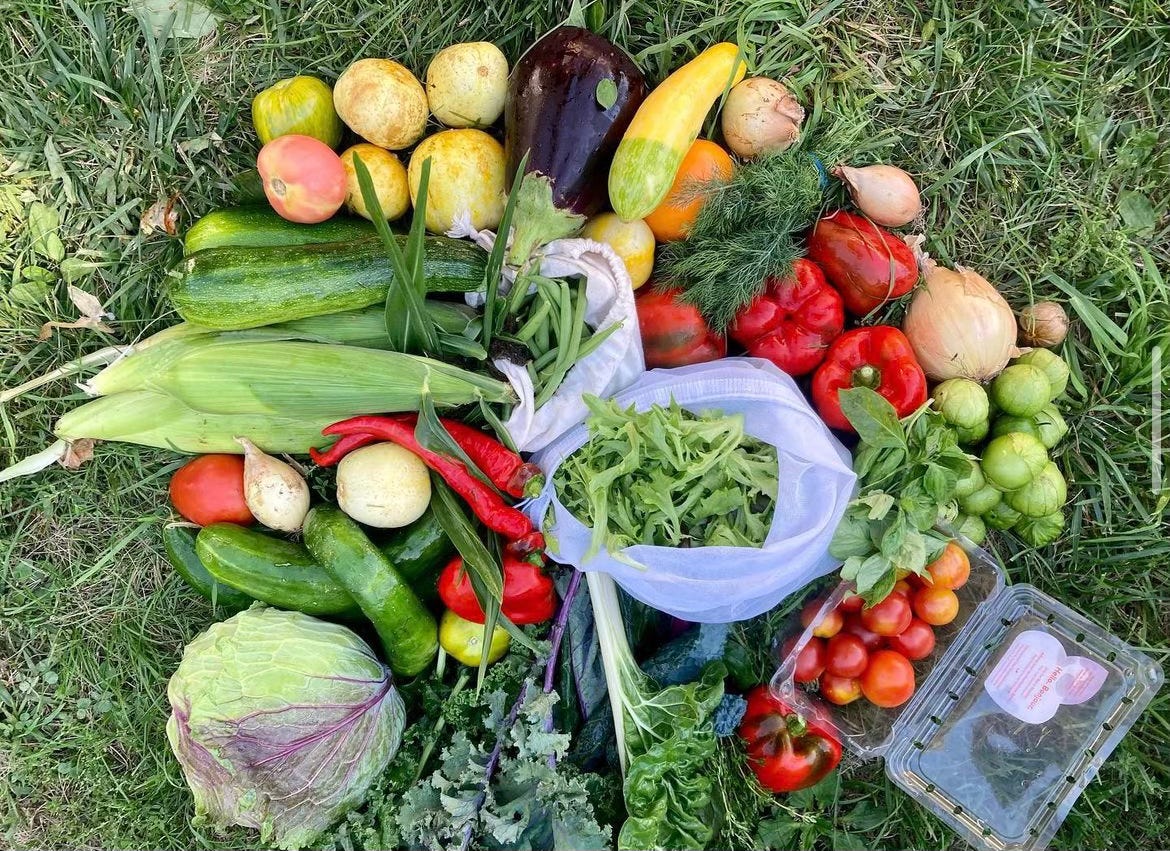

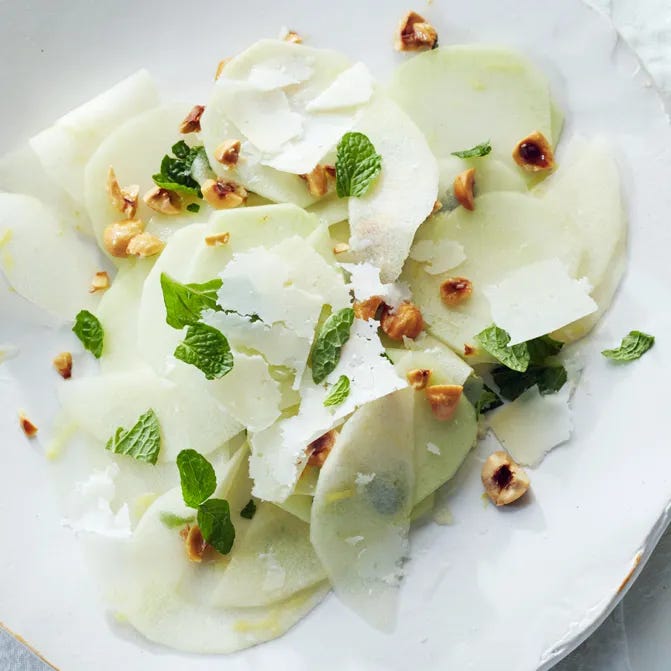
My dad and stepmom always had a huge vegetable garden in the summer since my Dad moved into the house after my parents split. Thanks to him I’ve tried so many summer and fall squash, found what beans I prefer and how to blanch and store them in the freezer, and how to make our own marinara the few times we had an abundance of tomatoes. It was a labor of love (especially near the end of his life when he owned his own auto repair garage and was working 12 hour days) but I’m thankful for his lessons in the garden.